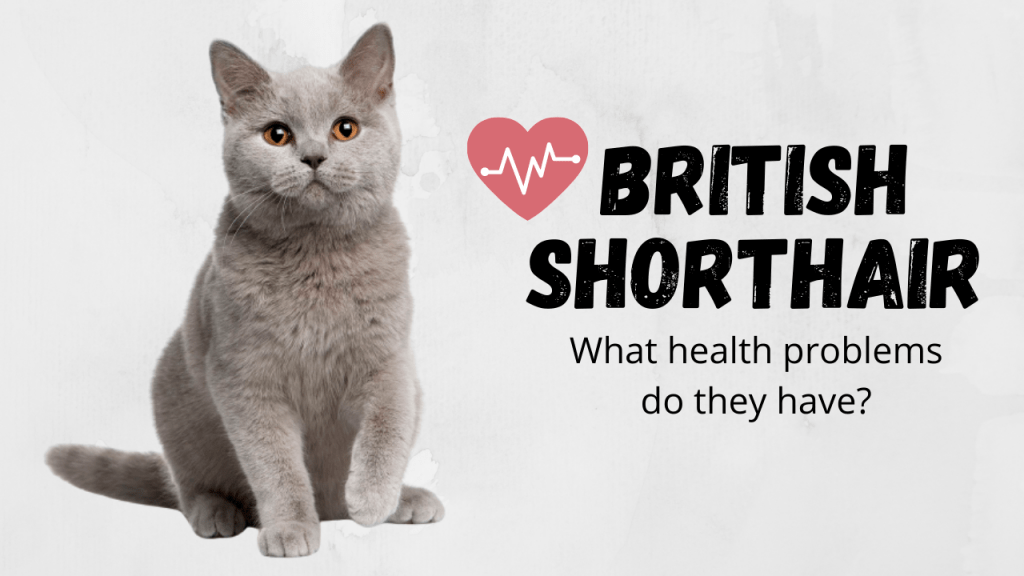
British Shorthair enjoys good health, however, they can also have some health problems. However, the British shorthair cats are prone to some genetic and hereditary diseases that ask for some special care of the owner.
British Shorthair is an amazing breed with a short coat and a well-rounded body. This cat breed has a strong and muscular body and generally shows good health.
Health Issues of the British Shorthair
The British shorthair is prone to many genetic diseases which means that these health issues are related to the breed. These genetic health problems are very common and have a strong impact on the health of a British Shorthair. This does not mean for sure that your British shorthair is going to have these diseases but it shows that your cat may be more vulnerable to get into these diseases than other cat breeds.
The following are the most common health concerns of a British shorthair breed.
1). Obesity
Obesity or weight gain is one of the major health concerns of the large cat breeds like the British Shorthair.
The British Shorthair is a large and heavy cat that weighs about 15 to 17 pounds. This is the ideal weight for this breed to maintain its good health but if the weight increases, it can be a threat to the health.
The British shorthair is a lazy, inactive, and less-playful cat breed and these factors make it prone to get obese more than other breeds. Obesity itself is a big problem and it can lead to many other serious health issues. Many types of research have shown that weight gain in British shorthair can decrease their lifespan.
Weight gain or obesity can cause diabetes to develop in a British shorthair. It is a hereditary disease and gets more activated due to obesity. More weight, more obesity.
Due to obesity, a cat can also have arthritis, a bone disorder, and can have difficulty in mobilizing. Hepatic lipidosis is a liver issue in which the liver gets fatty due to excessive weight gained by the cats. Many heart diseases also occur in cat breeds due to the same reason, obesity. Consider investing in a best-quality cat diet food to prevent obesity in British Shorthair cat.
2). Deafness
Deafness is a common problem of cats with white color and blue eyes. These cats are mostly born with less or no hearing ability. If you find that your British shorthair is not paying attention to your voice or call, take it to a vet. If it is genetic nerve deafness, it cannot be cured. But if it is caused by some ear infection or like ear polyps, then the vet will start the treatment. Cats with deafness disorder are easy-going if kept indoors but going outside is very dangerous for their life. They can be attacked by predators or can get into an accident.
3). Neonatal isoerythrolysis
Neonatal isoerythrolysis is another fatal disease of cats with type B blood like British Shorthair. This is an immune-mediated disorder in which a kitten is affected. This disease occurs when a kitten with type A blood nurses milk of a mother with type B blood,
The colostrum of the mother British shorthair contains immunity against type A blood. When this milk is ingested by the kitten with type A blood, it results in building immunity in the body of the kitten and starts destroying the red blood cells. In this way, a kitten dies after a few days or even hours of birth.
4). Cataracts
This is a blindness disorder that mainly appears in the older British Shorthair cats. In this disease, the lens of the cat becomes opaque or clouded and created difficulty of vision. This problem can be corrected by surgery. If not treated well and on-time, a cat may lose its sight forever.
5). Polycystic Kidney Disease
Polycystic Kidney Disease is a genetic disease. The affected kittens are born with the kidneys with cysts. As the kittens grow, the cysts also grow and start increasing the size of the kidney. A time comes when the affected kidney is destroyed.
The symptoms of Polycystic kidney disease start appearing when British Shorthair is over 7 years old and there is no cure for this disease. Some medicines can slow the destruction process of the kidney but the cat dies one day, soon after the diagnosis.
6). Hemophilia
Hemophilia is a blood clotting disorder. A British shorthair seems a normal cat until it gets injured or goes through surgery. The wounds that start bleeding, keep on bleeding, and do not stop. The excessive bleeding most of the time results in the death of the cat.
7). Cardiomyopathy
This heart disease can be inherited or can be a cause of other factors like obesity. There are 2 types of Cardiomyopathy.
- Hypertrophic Cardiomyopathy
In this type of heart disease, the overactive thyroid gland in the body the heart to get thickened and affects the rate of pumping and other functioning of the heart.
- Dilated Cardiomyopathy
This type of heart disease is caused by the deficiency of amino acid taurine. This deficiency can be recovered by using cat food containing this dietary element.
- Arterial Thromboembolisms
It is another type of heart disease in which the blood gets clotted in the main aorta of the heart. It is the major blood vessel that supplies blood to the hind legs. When the blood gets clotted and does not reach the hind legs, the legs get frozen, paralyzed, and become extremely painful.
8). Peritoneopericardial Diaphragmatic Hernia
PPDH is an inherited disease and is not very common. This disease occurs when the organs of the abdomen are squeezed in the diaphragm into the chest cavity. Due to this problem, the cat breeds show the symptoms of vomiting and difficulty in breathing. This disorder can be corrected by surgery.
9). Parasites
Parasites are a major concern for the health of cats like British Shorthair. Worms, bugs, roundworms, heartworms, hookworms, fleas, mites, and ticks can be ingested by the cat and can enter its body through dirty water and an unhygienic environment. These parasites are a sign of danger not only for the life of the British Shorthair cat but also for the cat owners. We recommend that you buy any of these best and safest cat dewormers for eliminating parasitic worms and round worms.
Treatment of the Diseases
There are various ways to protect British shorthair from these diseases.
- Do not feed your British Shorthair with free-meal all day. Divide its food into 2 or 3 times small meals. Also, engage your cat in the activities that will keep it active and playful. This will save your cat from getting obese.
- Whenever a kitten is born, immediately check its blood type before it starts nursing on the first milk of the mother. If the blood type matches, unite the kitten with the mother, if not, separate them apart.
- The kittens or cats with hemophilia must be strongly protected from getting wounds. Their unnecessary surgeries must be avoided as well.
- Use proper cat food to fulfill the dietary and nutrients requirements of the cat.
- Do not delay for the surgeries if they are essential for saving the life of your cat.
- Keep the British shorthair clean. Brush its coat twice a weak and bath it at least once a week to protect it from parasites.
- Take your British Shorthair for regular checkups and provide all the medicines that can decrease their pain and suffering.
Final Words
British Shorthair is an affectionate breed and is an easy-going breed but it is prone to some genetic and some inherited diseases. Some can be fatal but your love, care, and timely treatment can save the life of your British Shorthair.








